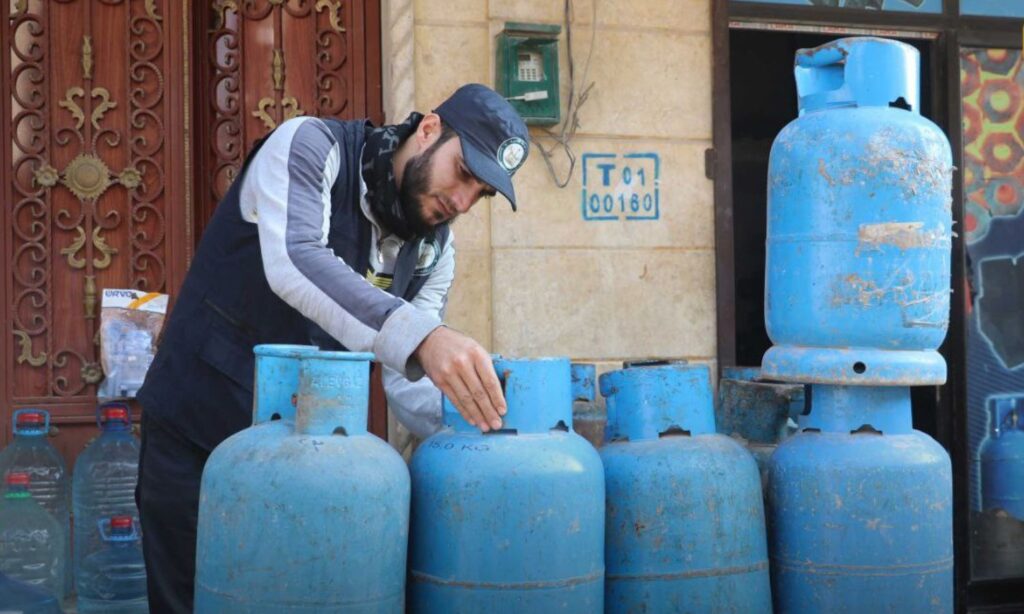Malik carries his gas cylinder, moving between the neighborhoods of the city of Idlib, hoping to find a seller who retains some gas bottles, even at a higher price amidst a gas outage crisis that has lasted for days, adding to the daily concerns and struggles that plague the young man.
Malik al-Hamidi (40 years old), a displaced person residing in Idlib, said that his household’s gas cylinder had run out three days ago, and despite continuous searching, he has not found any filled cylinders in Idlib’s shops. This is happening at a time when families are forced to prepare meals during Ramadan, and sweets before the Eid festival.
Idlib province is experiencing a gas outage crisis, amid fears of its continuation in the coming days, a time when housewives’ reliance on gas to cook iftar meals and prepare maamoul and Eid sweets increases, as do fears linked to traders monopolizing and selling at a higher price.
The price of a 9-kilogram gas cylinder in Idlib is $13 (1 dollar equals 32 Turkish liras), an amount roughly equivalent to four days’ wages for a worker, while the price of the cylinder during crises can exceed $17.
Fears precede Eid al-Fitr
Mrs. Hasnaa al-Mohammad, a housewife from Idlib, bought flour, ghee, and dates to prepare Eid al-Fitr sweets, but running out of gas threw her off and left her in a dilemma whether to buy ready-made sweets from the market and incur additional financial costs, or to wait in the hope that her husband can secure gas before Eid.
The last days of Ramadan are a season for sweet shop owners, but the gas outage has caused a crisis for them and concerns about having to stop working during the days they wait for every year.
Adnan al-Abbas, who works in making sweets in Idlib, told Enab Baladi that he needs at least one gas cylinder daily to operate the sweet ovens at this time of year, he fears stopping work despite having reserve gas cylinders in case the crisis continues.
Huda Issa (45 years old), from her home in Idlib with the assistance of employed housewives, prepares some labor-intensive foods, and during the festive periods, she makes sweets for those who want them, to support her family of six members after the death of her husband.
Huda told Enab Baladi that during such days, she makes about 30 kilograms of sweets for some acquaintances, but she fears not being able to fulfill all the orders if gas is not available, pointing out that she has only one spare cylinder that will only last her a few days.
She mentioned that her inability to take on orders would increase her struggles in securing her family’s expenses.
As a temporary solution, some families have turned to relying on electric ovens, leading to increased demand for them in sweet preparation, while other families have turned to wood-fired ovens as an alternative.
Talha al-Oweid (55 years old), residing in Arab Said area west of Idlib, told Enab Baladi that the demand for sweets has increased as he owns a wood-fired oven.
And with the interruption of any commodity and difficulty in obtaining it, some traders who possess it raise the price, without adhering to the set price.
Ahmad al-Sulaiman, the Public Relations Manager at the Directorate of Petroleum Derivatives in the Syrian Salvation Government (SSG), attributed the crisis to the delay of the supplying company in Turkey in delivering the gas shipment and the company’s shutdown for two days.
He told Enab Baladi that domestic gas will be available within two days, with promises to compensate for the shortage in the market.
Since December 2021, fuel companies operating in Idlib have set fuel prices in US dollars, after the multiple devaluations of the Turkish lira at that time.
Fuel prices in northern Syria are affected by global oil prices and were previously affected by the numerous devaluations of the Turkish lira against foreign currencies.

